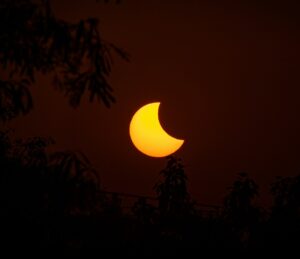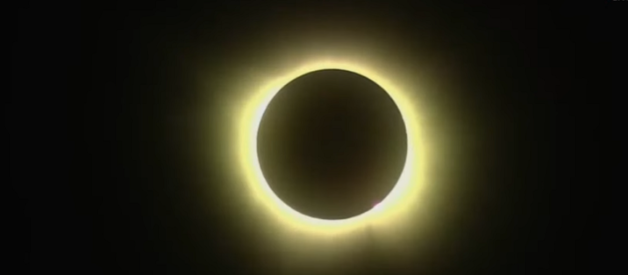April 8, 2024. You probably know where you were. Millions of people in the United States watched the solar eclipse that day. For many, it was a total eclipse; for many more, only partial. Either way, it was spectacular. CW and I observed it with another couple from our house in Ohio, which was in the totality band. However, we managed to miss a good bit of it.
For days, TV news was preparing the country. Over and over, I heard the time of the event announced. For us, that was 3:10 p.m. Not having done my homework, though, I didn’t realize that was the exact time totality would begin and that the eclipse would actually start long before that.

We grilled outside and ate a leisurely lunch inside. After cleaning up the kitchen, we finally ambled out to the backyard sometime after 2:00, into brilliant sunshine. We put our chairs in place in the grass and then wandered around the yard killing time. Through our forsythia bushes, four bright orange chairs caught my attention across the road in another backyard. They were occupied, and I mentioned to CW that the people were already in place waiting for the eclipse to begin.

Soon after that—2:33 p.m. to be exact—CW received a text from a friend back in Kentucky enjoying the eclipse and the good weather for it. How could the eclipse already be happening there? A minute later, our friends received a text from their son about how amazing the eclipse was, and he was only about 15 miles from where we were! We quickly put our glasses on and discovered a huge chunk of the sun was already gone. Really?

Without the safety glasses, everything looked gloriously bright, yet a fourth to a third of the sun was already eclipsed. I obviously wasn’t well educated in this phenomenon because this far into the eclipse I had expected a darkening of the sky to begin. Less sun, less bright.

We settled into our chairs. I watched as the moon advanced across the sun to the 50% mark…then to the 75% mark. Still no noticeable change in brightness. At 85% only a banana-shaped portion of the sun was visible, yet it was enough to keep us drenched in yellow light from 93 million miles away.

As I later reflected on how a slim banana of sun could light up the earth so completely, I thought about the sun being one of the metaphors used for God in the Bible. “For the Lord God is a sun and shield…” (Psalm 84:11). Among the many comparisons we can make between the sun and God, two major ones concern light and life.

If not for the sun, our world would be in total darkness. We couldn’t see anything, and our understanding of the world would be greatly compromised. We would live in confusion, disorder, depression…desolation.
Spiritually, our great light is God. David said, “The Lord is my light and my salvation…” (Psalm 27:1). Isaiah prophesied that Jesus was the coming light of the world: “The people walking in darkness have seen a great light; on those living in the land of the shadow of death a light has dawned” (Isaiah 9:2). Jesus himself said, “I am the light of the world…” (John 8:12).

Just as the sun eliminates darkness on earth, the light of Jesus delivers us from spiritual darkness. When we follow him, he shines brightly into our lives, opening our hearts to increasing knowledge of him so we will no longer live in ignorance and despondency.
Light leads to life. The sunlight warms Earth, and together, light and warmth make life possible on our planet. No sun, no life.
In the same way, the light of Jesus makes it possible for us to be alive spiritually. “…Whoever follows me will never walk in darkness, but will have the light of life” (John 8:12). Speaking of himself, Jesus said, “For the bread of God is he who comes down from heaven and gives life to the world” (John 6:33). “I am…the life” (John 14:6).
Jesus, our light, is the giver of life and is the life. The Greek word zóé means “All life (physical and spiritual), throughout the universe…it always (only) comes from and is sustained by God’s self-existent life” (HELPS Word-studies). No Jesus, no life in the Spirit.
With the thought of Jesus as our light and life, I returned to my fascination with the banana. If that slim 15% of non-eclipsed sun could light up my backyard so brilliantly, can I also receive enough of the light of Jesus for an abundant life when my understanding of God is limited, or eclipsed?
It’s a fact that we cannot comprehend everything about God. He said, “As the heavens are higher than the earth, so are my ways higher than your ways and my thoughts than your thoughts” (Isaiah 55:9). The created cannot totally understand its Creator. The imperfect cannot understand the Perfect. We were not meant to.

We also are not capable of seeing God’s full glory. When Moses asked the Lord to show him his glory, the Lord caused all his goodness to pass by in front of Moses, but Moses wasn’t allowed to see his face. God protected him from the full power of his glory by putting him in a cleft of a rock and covering him with his hand. After God passed by, he removed his hand so Moses could see his back, which represented the reflection of his glory (Exodus 33:18-23). As long as we inhabit these earthly bodies, we are limited to seeing only a reflection of God’s glory.
So if I can’t see God’s full glory and fully understand him because “now we see but a poor reflection as in a mirror…” (1 Corinthians 13:12), am I only able to experience God partially? Back to the banana.
The sun is a huge mass of hot gas, mostly hydrogen and helium. When I look at a sliver of sun, I see everything the sun is. The part I can’t see is just more of what I am looking at, not anything different. Could it be the same with God? Maybe he isn’t into percentages.
Paul said, “9For in Christ all the fullness of the Deity lives in bodily form, 10and you have been given fullness in Christ…” (Colossians 2:9-10).
The word translated fullness in verse 9 is pléróma and means “sum total…even (super)abundance” (HELPS Word-studies). It is all God’s attributes and being. Everything God is lives in Christ—his grace, goodness, forgiveness, love, justice, mercy, creativity…. Nothing of God is missing.
In verse 10, Paul says we share this fullness in Christ. Fullness here is pléroó and means “to complete” (Strong’s), “fill to individual capacity” (HELPS Word-studies). When a person is born into God’s family and Jesus comes to live inside him, he is filled to capacity with all that God is. Nothing is lacking that he will ever need. He has all of God in Jesus. Wiersbe says, “His spiritual growth is not by addition, but by nutrition. He grows from the inside out. Nothing needs to be added to Christ because He already is the very fullness of God.” [1]
God doesn’t hold back anything good from those who walk with him (Psalm 84:11). In fact, the very reason Jesus came was for us to have a full life. He said, “The thief comes only to steal and kill and destroy; I have come that they may have life, and have it to the full” (John 10:10).
Remember that gift of life earlier that only comes from God and is God? He is not stingy. The word full is perissos and means “more, greater, excessive, abundant, exceedingly, vehemently” (Strong’s). Also, “beyond what is anticipated, exceeding expectation; more abundant, going past the expected limit (‘more than enough…’)” (HELPS Word-studies). And “over and above, more than is necessary, exceeding abundantly, supremely” (Thayer’s Greek Lexicon). That’s how much God gives us of himself!
Even though here on Earth we can’t understand all God’s ways or see his full glory, we can experience all he is through Christ. Like that banana of sun illuminating my yard, God shines “the light of life” into the lives of those who follow him (John 8:12), withholding no aspect of his being from them.
I’m thankful God does not relate to us in percentages, but fully gives himself to us.
Scripture quotations are from NIV.
Greek definitions are from Bible Hub. See Resources.
[1] Wiersbe, Warren, The Bible Exposition Commentary, New Testament: Volume 2, p.126






marilyn
May 14, 2024Thank you, Bonnie for the time you invest to bring insights into God’s word.
Marilyn
Bonnie
May 14, 2024I appreciate your comment, Marilyn. Thank you. I’m grateful for this way to share my thoughts…and for people like you who take the time to read them. 🙂
Brenda+Murphy
May 14, 2024That is so interesting Bonnie! You make a very good point and I like it. I liked this: “When a person is born into God’s family and Jesus comes to live inside him, he is filled to capacity with all that God is.” Whoa! Our eclipse would only show every few minutes through the clouds but I didn’t want to invest that much time anyway. Every fifteen minutes I’d run out and check with my glasses. We didn’t have totality but it was cool anyway. 🙂
Bonnie
May 14, 2024I am working at reminding myself that all of God’s character and being are in me now. In the past, I’ve tended to ask Him for things that He already gave me. Rather, I need to acknowledge they are there, thank Him for them, and walk with Him in such a way that they can grow.
Thank you, Brenda.
Angie Camp
May 14, 2024The topic of God’s amazing attributes always speaks to me.
He is:
self-existent omnipresent loving
wise faithful glorious
immutable good holy
self-sufficient merciful
omnipotent just
omniscient gracious All praise to Him! Angie
Bonnie
May 14, 2024Yes, truly amazing! What a great list. Thank you, Angie.